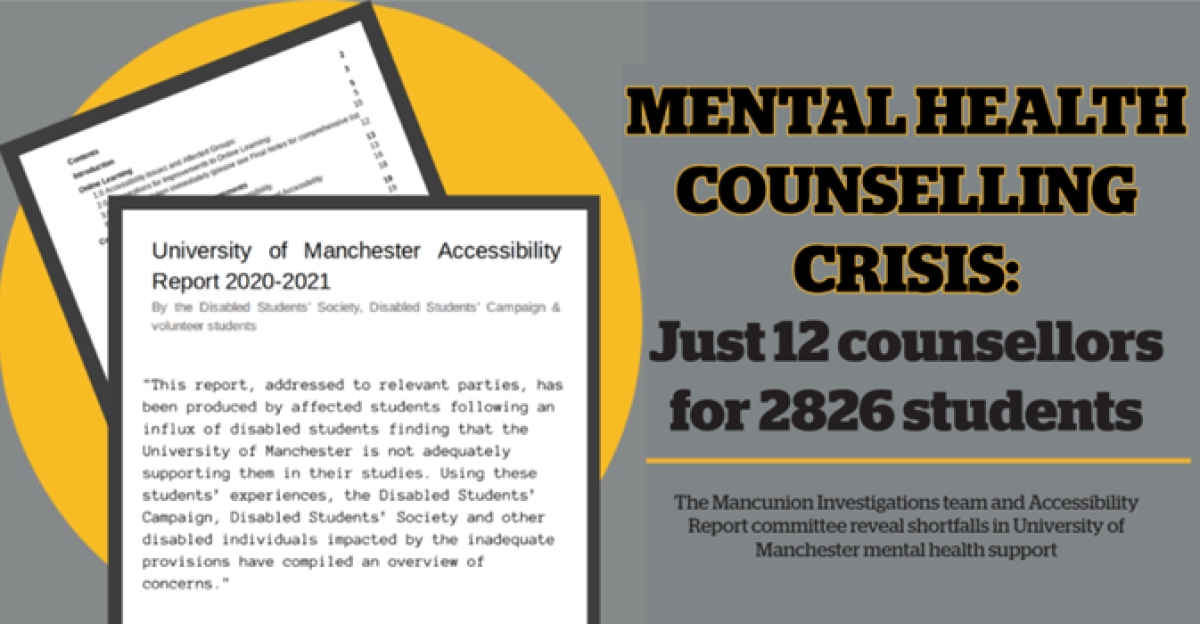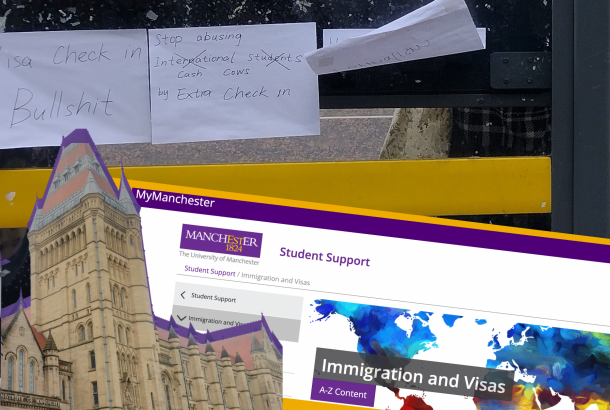Mental Health Counselling Crisis: Just 12 counsellors for 2826 students

The number of students registered with the Disability Advisory Support Service (DASS) for mental health issues has increased steadily from 2333 in 2018/19, but the number of students receiving at least one private counselling session with the University’s service has dropped by 10 per cent from 3266 to 2910, an FOI request reveals.
Students have reported struggling to access the service, with one* saying: “I called them multiple times, only to not get any answer or be told the week was already full and to try the week after”.
In response the University of Manchester spokesperson said, “For a period of time during lockdown and remote operation access to the appointment line became more difficult. In recognition of this … we have recruited 4 triage and support workers offering the first point of contact to all callers and introduced a new caller management system. This allows the appointment line to be available throughout the day and routine next day appointments are offered. Urgent and crisis queries will be offered same day support. In addition the duty counsellor responds to all email queries.”
But the University’s claims of a same-day booking service have reportedly led GPs and Community Mental Health Teams (CMHT) to rely on the University’s system, rather than offering external support to student patients.
“The lack of support for people is ridiculous and endangering lives”
Communication between the CMHT and University services appears to be lacking. A student with Depression, Anxiety, Schizophrenia, Agoraphobia and PTSD reported: “I was not receiving any form of talking therapy from the Community Mental Health Team when the University turned me away, and the CMHT wouldn’t give me any talking therapy because I could supposedly get it through the uni counselling service.”
In response the University explained that referrals to external services are only made when students need more specialist and extensive support than could safely be offered within a university service. They said the “C&MH service would endeavour to continue to support these students whilst making assertive efforts to secure an appropriate NHS service.”
The Disabled Student’s Society and the Disabled Student’s Campaign looked into mental health during their 61-page ‘accessibility report’, finding that “the most vulnerable students felt alienated by the service”, with the Student Mental Health Services allegedly refusing to treat self-harming students with Borderline Personality Disorder “because they will not be willing to listen to [the service]”.
“The most vulnerable students felt alienated by the service” – Accessibility Report
A UoM spokesperson said: “It is not possible to meaningfully comment on this without more information to enable us to look into it. This description does not reflect our practice and students are not refused support.”
Amongst disabled students who responded to a survey created by the report committee,* 95.5 per cent felt that University impacted upon their mental health somewhat or very negatively. 69.2 per cent didn’t believe the University would help them in a mental health crisis.
Students quoted anonymously in the report said: “The University rarely seeks to address the causes of mental health struggles, when in many cases the University itself is responsible for those issues” and “the lack of support for people is ridiculous and endangering lives”. One student even said: “The direct impact of a lack of support from the University has led to multiple suicide attempts and mental health crises on my part.”
A University of Manchester spokesperson said: “Using a stepped care model we provide resources across the full spectrum from preventative wellbeing support, through workshops and groups, 1:1 support, mental health and risk assessments and active referral into the GM Universities Student Mental Health Service and appropriate NHS services.”
The number of undergraduates disclosing mental health issues during the application process rose from 234 in 2018/19 to 362 in 2020/21. In each of the past three academic years new Mental Health disclosures to DASS (either developed or subsequently disclosed at University) remained above 1000, The Mancunion can reveal.
95.5 per cent of students responding to a Disabled Student’s Society survey felt that University impacted upon their mental health somewhat or very negatively
Another key concern from the report was the complaints process for students who are dissatisfied with the University’s support. The data gathered from a Freedom of Information request submitted by The Mancunion reveals no formal complaints have been filed against the University Counselling Service in the last three years. Moreover, there were just seven informal complaints or cases of negative feedback recorded.
But students were reportedly struggling to make complaints, with one respondent saying, “I left and cried and wanted to file a complaint but didn’t know how.” Another claimed to have made an “official complaint” after “one counsellor was very inappropriate and actively harmful to me”, but there is no record of this in the data supplied by the University of Manchester.
The official complaints procedure requires the complaint to be in writing and marked as confidential to the Head of Counselling. But the Accessibility Report called for change in this process as “students have reported not feeling comfortable or supported in making a complaint about the counselling service/SMHS, as well as simply not being made aware of how to even do this.”
A University of Manchester spokesperson said: “All informal complaints or feedback are responded to by the Head of the relevant service. Students are able to make formal complaints about any aspect of University through the Student Complaints Procedure.”
In response to the informal complaints the UoM has said various action was taken such as “changes to procedures, additional training for individual staff, changes to information on the website.” However, a student who complained of “discriminatory” behaviour towards them and their partner, “did not feel that [their complaint] was handled seriously, and they believe that the member of staff is still employed there”.
Students also complained that the ‘Six ways to wellbeing’ and other mental health related communication, frequently mocked on Instagram and Facebook were not adequate support.
The University told The Mancunion the model is based on New Economics Foundation evidence and is aimed at empowering students to support their own wellbeing.
Nor were the workshops, described by students as “overly trivial, and ultimately not useful, or even harmful”. Yet students felt pressured into attending them although “building them into my timetable felt like an extra stress factor”.
The University reiterated that attendance is optional, and of the students who did attend feedback was overwhelmingly positive.
Some students in the Accessibility Report alleged the University Counselling Service “did not do enough to help me because I didn’t have just one problem”. However, the University said it “is impossible to meaningfully comment on without further information”.
The Accessibility Report has called for a “full review of mental ill-health in conjunction with disability”, as well as an online booking system for appointments, the ability to book more than a one-off appointment and an “adequate complaints procedure”.
The University set up a “Task and Finish Group in response to the Accessibility Report, which included representatives from across the university including the Disabled Student Network and the authors of the report.” Recommendations will be published shortly.
When contacted for comment, a University of Manchester spokesperson said: “The mental health and wellbeing of our students is of the utmost importance to us. That is why we invest millions of pounds every year into support for them in this area. We have one of the largest offers and biggest spends on mental health and counselling services of any university in the country. “We consistently listen to student feedback and have again increased the size, range and scope of the services we offer this academic year. These range from on-campus advice and support to newer platforms such as our wellbeing app and 24/7 phone line. It must also be said our staff work tirelessly and extremely hard – sometimes around the clock – to ensure our student’s mental health, wellbeing and safety is maintained throughout their studies at the University.”*This data is as of 24th April 2021. The exact numbers are 12.2 FTE counsellors and 5.4 FTE Mental Health Nurses (as equivalent to full-time hours). Whole numbers have been used in this piece for clarity. The University are currently in the process of recruiting another full time counsellor, a part time mental health nurse, and one full time social prescriber. **All student quotes are anonymous in this piece ***23 students responded to the survey.







